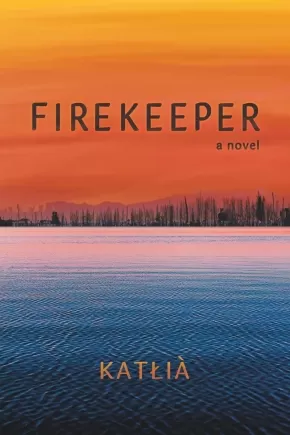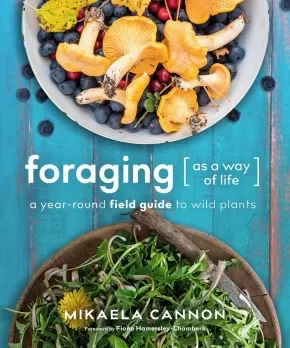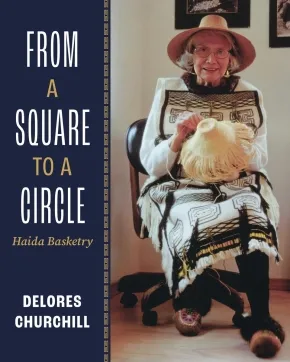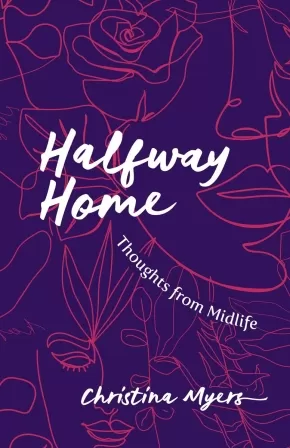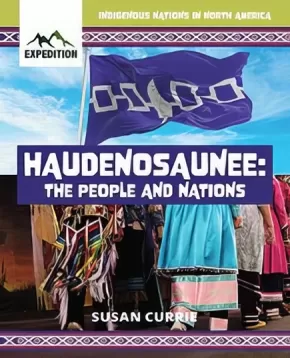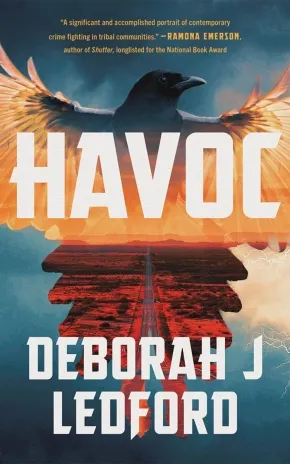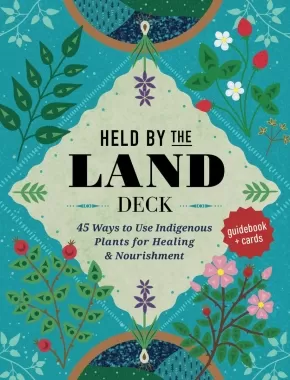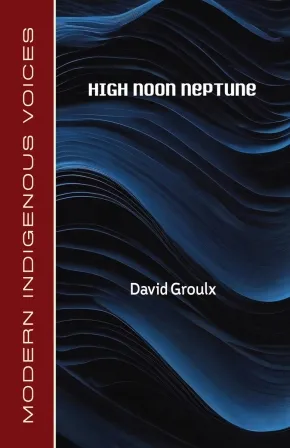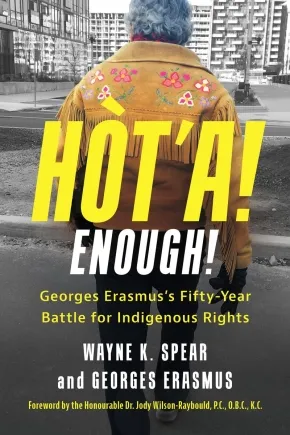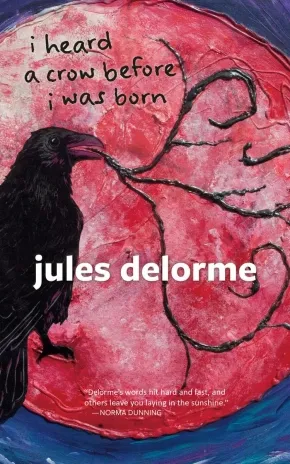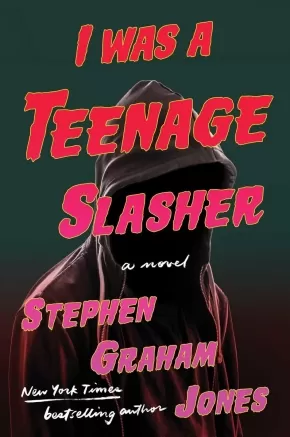
Books
181
-
195
of
1928 Results;
Sort By
Go To
of 129
Firekeeper: A Novel
$24.00
Format:
Paperback
Text Content Territories:
Indigenous Canadian;
Reading Level: N/A
ISBN / Barcode: 9781773636573
Synopsis:
Synopsis:
Nyla has an affinity to fire. A neglected teen in a small northern town—trying to escape a mother battling her own terrors—she is kicked out and struggles through life on the streets. Desperate for love, Nyla accidentally sets fire to her ex’s building and is then incarcerated for arson. Through community-led diversion, Nyla finds herself on a reserve as their firekeeper. But when climate change–induced wildfires threaten her new home, she knows intimately how to fight back.
The fourth book from acclaimed writer Katłıà brings a Northern Indigenous perspective to the destructive effects of ongoing colonialism. Displaying Katłıà’s enthralling storytelling style, Firekeeper is a coming-of-age tale that addresses intergenerational trauma by reclaiming culture, belonging and identity.
Join Nyla on her healing journey through the fire to sacred waters.
Reviews
“Katłıà’s Firekeeper is an enchanting page-turner of a novel that captured my heart from start to finish. It’s an essential story about finding spirit, family, and home, told through one of the strongest and most authentic protagonists I’ve ever read. I felt like I was right there with Nyla through all her tragedies and triumphs, which is testament to Katłıà’s smooth and heartfelt prose. This book is a celebration of the resilient spirit and leadership of Indigenous women.”—Waubgeshig Rice, author of Moon of the Crusted Snow
“Written with searing truth and genuine heart, breathtaking at times in its description of life, living, dying and death - Firekeeper is a loving testament to the power of kindness and of gentleness. Piercing and honest, with an eye for detail in chaos, the writing and voice are humble and humbling. This is Katłı̨̀ą’s best work to date.”— Tracey Lindberg, writer, scholar, Indigenous Rights activist and the author of Birdie
Additional Information
176 pages | 5.50" x 8.50" | Paperback
First Métis Man of Odesa
$18.95
Format:
Paperback
Text Content Territories:
Indigenous Canadian; Métis;
Reading Level: N/A
ISBN / Barcode: 9780369105127
Synopsis:
Synopsis:
Matt and Masha hit it off during a theatre research trip in Ukraine. At first they seem like opposites: Masha loves the sea, Matt loves mountains. Masha is Ukrainian, Matt is Métis. But the passionate spark ignited between them cannot be denied. Despite the improbabilities of a cross-continental relationship, a few fairy-tale visits overseas solidifies their bond. But when it seems distance could be the only obstacle in their path, a series of extreme circumstances put their commitment to the ultimate test.
Based on actual events, First Métis Man of Odesa is the extraordinary true story of a whirlwind romance that withstands a global pandemic, a surprise pregnancy, and the Russian invasion of Ukraine. Transcending the usual tropes of documentary theatre, this heartwarming how-we-got-together tale turns art of the here and now into a catalyst for action and a hopeful ode for a better future.
Awards
- 2024 Dora Mavor Moore Award for Outstanding New Play winner
Reviews
“A star-crossed, windswept, war-torn romcom that waltzes back and forth across the threshold that separates dreams from nightmares.” — Ben Waldman, Winnipeg Free Press
“Many of the best tales in the show are so deeply improbable, or so straightforwardly honest, that the plot lines could never have held up as fiction; but as the true stories they are, they triumph.” — Julia Peterson, Saskatoon StarPhoenix
“For all its full-blown drama, First Métis Man of Odesa retains a dreamy charm without ever letting go of the truth.”— Liane Faulder, Edmonton Journal
Additional Information
80 pages | 5.12" x 7.62" | Paperback
Flourishing Kin: Indigenous Wisdom for Collective Well-Being
$26.99
Format:
Paperback
Text Content Territories:
Indigenous;
Reading Level: N/A
ISBN / Barcode: 9781649632043
Synopsis:
Synopsis:
From Indigenous scholar Yuria Celidwen comes a first-of-its-kind book about our aspiration for sustainable, collective flourishing through Indigenous wisdom, traditions, and practices that bridge Indigenous and Western knowledges and ways.
How do we cultivate happiness? When facing the monumental challenges of our world, we often end up disconnecting in order to focus on our mental health. Dr. Yuria Celidwen explains this focus on our own state of mind alone is precisely why so many of us struggle to flourish. “What’s been overlooked is the Indigenous perspective of relationality,” she says. “It is the understanding that happiness is only possible in community, when we cultivate our relationships toward all kin, from human to more-than-human, and to our living Earth.”
Dr. Celidwen’s research shows the tremendous benefit of integrating Indigenous approaches into our approach to well-being, while recognizing the gains made by Western positive psychology, mindfulness, and neuroscience. In Flourishing Kin, she identifies seven key principles found in Indigenous cultures worldwide that embrace virtue, ethical living, and spirituality. Each principle—Kin Relationality, Body Seed, Senshine, Heartfelt Wisdom, Ecological Belonging, Collective Well-Being, and Reemergence—is a seed to flourishing kin, and reveals how we can overcome isolation and climate anxiety, nourish healthy relationships with our communities and environment, and build strong foundations of well-being that elevate our life choices for the benefit of our whole planet.
Sustainable collective flourishing goes beyond optimism or resilience. Offering opportunities for exploration, reflection, and personalized insight, here you’ll find shared storytelling, cultural tradition, and other forms of enhanced contemplative practice like ritual, music, movement, and art to support your journey. Through poetic expression and authentic truth telling, Dr. Celidwen invites us to experience a path to fulfillment that allows us to meet the world in all its complexity with reverence and joyous commitment to participate in the flourishing of all living beings.
Additional Information
256 pages | 6.05" x 8.95" | Paperback
Foraging as a Way of Life: A Year-Round Field Guide to Wild Plants
$44.99
Format:
Paperback
ISBN / Barcode: 9780865719972
Synopsis:
Synopsis:
Find connection with the land and feed your family locally, seasonally, and sustainably
Nourish your family from nature's pantry. Foraging as a Way of Life documents twelve months of wildcrafting, featuring five different plants each month for a full year of abundant local and seasonal eating. Enhance your sense of self-sufficiency while increasing food security, protecting habitat, and connecting with the land.
This lavishly illustrated, accessibly written, in-depth resource features:
- Accurate and detailed descriptions of herbs, mushrooms, berries, and other wild plants to avoid confusion and inspire confidence when determining plant identification.
- Foraging recipes for remedies, tonics, syrups, and handcrafted unique dishes incorporating wild ingredients—feast on rosehip soup with pan-fried dandelion flowers, followed by birch-bark cookies or chicory chocolate bars.
- Extensive guidance for safe use or consumption of each species, including cautions, lookalikes, and tips for sustainable harvesting.
Drawing on the author's own lived experience and her study of herbalism and ethnobotany, Foraging as a Way of Life is designed to inspire readers to share the exuberance and joy of wild foods while finding nourishment and connection in their local fields or forests. A must for every gardener who would like to gather dinner while weeding, for those wishing to learn sustainable harvesting while hiking, or for anyone who wants to create healthy, foraged meals while living lightly on the planet.
Reviews
"Mikayla Cannon's passion for harvesting nature's abundance has yielded a comprehensive guide to foraging throughout the year. Beautiful photographs, detailed profiles, and numerous recipes make this book an exciting guide to reclaiming a naturally healthful diet." -Darrell E. Frey, Three Sisters Farm, and author, Bioshelter Market Garden and The Food Forest Handbook
"Foraging truly is a way of life for Mikaela Cannon, and this book captures her meticulously researched knowledge, practical experimentation, and deep respect for the earth and its Indigenous knowledge-keepers. It is beautifully illustrated, and includes recipes, medicinal uses, personal stories, detailed plant descriptions, and wise precautions."-Remy Rodden, biologist, award-winning envirosinger, and environmental educator
Additional Information
288 pages | 7.50" x 9.00" | 450 Colour Illustrations | Paperback
From a Square to a Circle: Haida Basketry - Delores Churchill's Memories of Learning to Weave
$34.95
Format:
Paperback
Text Content Territories:
Indigenous Canadian; First Nations; Haida;
Reading Level: N/A
ISBN / Barcode: 9781990776854
Synopsis:
Synopsis:
Delores Churchill, Haida weaver, shares the stories of her life, her culture and the importance of passing cultural knowledge from one generation to the next. Told with humility, humour and deep respect, From a Square to a Circle is a testament to the values of her people, a technical guide to her masterful weaving skills and a gift to the reader at every point along her journey.
Part memoir, part how-to guide, this book shines light on Delores’s weaving teachers, including her strong-minded mother Selina (Ilst’ayaa), whose teachings Delores once resisted as a child. The Haida are connected to weaving through their history, which goes back thousands of years ago as shown through discoveries like the 4,000-year-old baskets at south Baranof.
Walk with Delores as she harvests cedar bark for baskets, Selina teaching “by modelling and then leaving the learner to imitate.” Learn the weaving harvest and preparation terminology. Follow the steps of how to prepare cedar bark, harvest spruce roots, and learn natural dye recipes. Photos and diagrams are visual aids that accompany the steps to Haida weaving techniques and instructions.
Having passed her skills on to hundreds of people, believing that “weaving belongs to all of us,” Delores wishes to share the knowledge of basketweaving where beginners and skilled weavers are able to express their distinct selves, just as every coastal Indigenous weaving style is unique. The love for basketweaving displayed in Delores’s writing is sure to make readers yearn to try their own hand at the craft.
Additional Information
256 pages | 8.00" x 10.00" | 240 Photographs | Paperback
Fur Trade Nation: An Ojibwe's Graphic History
$42.16
Format:
Hardcover
ISBN / Barcode: 9781962910002
Synopsis:
Synopsis:
We clothed the royals. We fed the worker. We guided the traveler. We abetted the soldier. We are not afraid to love. So begins Carl Gawboy's groundbreaking graphic history of the Fur Trade Era. From 1650 to 1850, the Ojibwe Nation was the epicenter of the first global trading network. Trade goods from Africa, Asia, Europe, and South America flowed into the Great Lakes region, floating along Ojibwe waterways in birchbark canoes paddled by mixed-race Voyageurs. Gawboy offers a fresh perspective on the fur trade era, placing Ojibwe technology, kinship systems, cultural paradigms, and women at the heart of this remarkable era, where they have always belonged.
Additional Information
202 pages | 8.25" x 11.00" | Hardcover
Halfway Home: Thoughts from Midlife
$23.99
Format:
Paperback
Text Content Territories:
Indigenous Canadian; First Nations; Kwakwaka'wakw (Kwakiutl); Da'naxda'xw Awaetlala;
ISBN / Barcode: 9781487012441
Synopsis:
Synopsis:
Award-winning author Christina Myers navigates the uncharted territory of midlife in a time of rapid social, cultural, and environmental change.
Modern midlife is finding oneself halfway home but without any reliable maps for the route ahead. With wit and warmth, these personal essays move from a first bra to first hot flashes to consider the lessons we learn through media and culture--and from each other--about bodies, sexuality, fatphobia, gender roles, and what we should want in life. Christina Myers explores the ways that beauty standards and cultural expectations around femininity have shaped our identities and how we might shed those going forward; the power of friendships and the value of having other women to learn from; the anxiety of moving through motherhood into menopause in a time of global environmental crisis and political upheaval; and the uncertainty of how this stage of life should unfold, as old systems shift and crumble. Though our maps for midlife are never identical, we discover familiar paths and common landmarks in each other's stories; these essays remind us there are others on this trail with us, just behind or just ahead, out of sight. We are not alone.
Reviews
"Reading Halfway Home feels like having a conversation with a very wise, witty friend. Christina Myers's delightful collection of essays about the stages of a woman's life is personal, but also universal. We've all been there, and it's a joy to realize that we're not alone on the journey." — Elizabeth Renzetti, author of Shrewed: A Wry and Closely Observed Look at the Lives of Women and Girls
"Christina Myers effortlessly charts the often-overlooked territory of being a woman in today's complex society. Through insightful personal essays, she explores the intricate intersections of femininity, friendship, motherhood, and environmental turbulence, all with a nostalgic flair. With much-needed humour and wisdom, Myers reminds us that even in the midst of uncertainty, we're never alone on this journey. This book is a necessary, heartfelt guide for those seeking their own unique path through the maze of midlife. A must read!" — Chelene Knight, award-winning author of Let It Go: Free Yourself from Old Beliefs and Find a New Path to Joy
"Halfway Home is a love letter to mothers and grandmothers, sisters and daughters, witches and crones. Christina Myers's storytelling is gentle and honest, a must-read memoir for women of all ages. So many times, I found myself nodding and exclaiming, 'Yes! That's exactly it!' It's a mirror but also an invitation to join a secret coven of wise women." — K. J. Aiello, author of The Monster and the Mirror: Mental Illness, Magic, and the Stories We Tell
Educator Information
Includes one chapter focusing on the author's Indigenous identity.
Additional Information
200 pages | 5.50" x 8.50" | Paperback
Haudenosaunee: The People and Nations
$16.95
Format:
Paperback
Text Content Territories:
Indigenous Canadian; First Nations; Haudenosaunee (Iroquois);
ISBN / Barcode: 9781774565124
Synopsis:
Synopsis:
The Haudenosaunee, like many Indigenous Nations and communities across North America, have their own history and culture. Discover the Peacemaker Story, which explains how the Confederacy was created. Learn about historical facts and their effects on present times. Get to know Haudenosaunee people who give thanks everyday and have many stories and traditions to tell.
Educator & Series Information
This book is part of the Indigenous Nations in North America series.
Additional Information
32 Pages | Paperback
Havoc
$24.99
Format:
Paperback
Text Content Territories:
Indigenous American; Native American; Taos Pueblo;
Reading Level: N/A
ISBN / Barcode: 9781662510458
Synopsis:
Synopsis:
In this tightly paced sequel to Redemption, Eva “Lightning Dance” Duran joins the Taos Pueblo tribal police department to uncover a member of her community’s murder…and the conspiracy behind it.
It’s been over a year since the case that almost broke her, but when Eva “Lightning Dance” Duran is called back to duty, she doesn’t hesitate to answer. A bank robbery has left an officer down and a suspect on the run. Law enforcement is in hot pursuit, and residents are on the lookout—but before anyone can catch the criminal, tragedy strikes.
A member of the Taos Pueblo tribe has been shot and killed. The culprit? An untraceable 3D printed gun. With the support of fellow tribal cops, Eva breaks the news to the victim’s family and swears to find justice.
More violence follows, feeding the rising racial tensions between the Taos Pueblo people and the Hispanic community. New evidence forces Eva to consider the possibility that the bank robbery and 3D guns are related, but until she figures out how, there’s no telling how deep this crime ring goes…or how far its evasive ringleader will go to protect it.
Reviews
“Ledford’s sequel to Redemption excels…For fans of books by both Tony and Anne Hillerman, along with others that embody the spirit and landscape of the Southwest.” —Library Journal
“Atmospheric, poignant, and set in the Taos Pueblo, Ledford’s tribal police officer Eva ‘Lightning Dance’ Duran doesn’t flinch in this dark, twisting tale that’s riveting from the first page. A fantastic second book in this new series from a master of crime fiction.” —Jamie Freveletti, award-winning and internationally bestselling author of the Emma Caldridge series
Series Information
This book is part of the Eva "Lightning Dance" Duran series.
Additional Information
352 pages | 5.50" x 8.50" | Paperback
Held by the Land Deck: 45 Ways to Use Indigenous Plants for Healing & Nourishment - Guidebook + Cards
$25.99
Format:
Paperback
Text Content Territories:
Indigenous Canadian; First Nations; Salish; Coast Salish; Squamish;
Reading Level: N/A
ISBN / Barcode: 9781577154440
Synopsis:
Synopsis:
Have Indigenous plant knowledge at your fingertips with this gorgeously illustrated card deck from Leigh Joseph, an ethnobotanist and a member of the Squamish Nation.
Plants can be a great source of healing as well as nourishment, and the practice of growing and harvesting from trees, flowering herbs, and other plants is a powerful way to become more connected to the land. The Indigenous Peoples of North America have long traditions of using native plants as medicine as well as for food. Held by the Land Deck includes 45 cards of indigenous plants and their properties and a 48-page booklet to guide you along the way. Here are some of the things you will find:
- Tips to build your own home apothecary
- Notes on how to mindfully harvest and connect to the land you’re on
- Recipes for infused oils and salves
- A botanical glossary to help out with some of the more technical language
- Checklists for safe and sustainable harvesting
This beautifully illustrated card deck includes plants that are culturally significant to the Pacific Northwest, including Western Red Cedar, Devil’s Club, Broad-Leaved Plantain, Camas, Wapato, and Red Laver. Special features in the booklet include recipes for food and beauty products along with stories and traditions around the plants.
This elegant, full-color card deck and booklet is your go-to guide for Indigenous plants and will give you new insights into the power of everyday nature.
Additional Information
48 pages | 4.50" x 5.90" | 45 Cards and 48-Page Booklet
High Noon Neptune
$19.95
Format:
Paperback
Reading Level: N/A
ISBN / Barcode: 9781772312225
Synopsis:
Synopsis:
High Noon Neptune is a powerful poetry collection that delves into important issues of loss, love, class, and capitalism. Throughout this book, the reader is taken on a journey of survival, where the intersections of identity and oppression are explored with clarity and reverence. The poems shed light on the complexities of living in a society that is rife with discrimination and inequality, and the battles that individuals face to survive within these intersecting systems. This book fearlessly navigates through societal and personal struggles with a sharp wit and bold defiance. With each poem, David Groulx confronts and challenges the societal norms and structures that perpetuate injustice and inequality. High Noon Neptune offers a raw and unapologetic perspective on the realities of navigating life as a marginalized individual. This poetry collection is a powerful testament to the resilience and strength of those who refuse to be silenced and continue to fight for survival.
Educator & Series Information
This book is part of the Modern Indigenous Voices series.
Additional Information
88 pages | 5.50" x 8.50" | Paperback
Hòt'a! Enough!: Georges Erasmus's Fifty-Year Battle for Indigenous Rights
$28.99
Format:
Paperback
Text Content Territories:
Indigenous Canadian; First Nations; Dene;
Reading Level: N/A
ISBN / Barcode: 9781459752900
Synopsis:
Synopsis:
The political life of Dene leader Georges Erasmus - a radical Native rights crusader widely regarded as one of the most important Indigenous leaders of the past fifty years.
For decades, Georges Erasmus led the fight for Indigenous rights. From the Berger Inquiry to the Canadian constitutional talks to the Oka Crisis, Georges was a significant figure in Canada's political landscape. In the 1990s, he led the Royal Commission on Aboriginal Peoples and afterward was chair and president of the Aboriginal Healing Foundation, around the time that Canada's residential school system became an ongoing frontpage story.
Georges's five-decade battle for Indigenous rights took him around the world and saw him sitting across the table from prime ministers and premiers. In the 1980s, when Georges was the National Chief of the Assembly of First Nations, he was referred to as the "Thirteenth Premier." This book tells the personal story of his life as a leading Indigenous figure, taking the reader inside some of Canada's biggest crises and challenges.
Awards
- 2025 Indigenous Voices Awards - Prose in English Award
Additional Information
320 pages | 6.00" x 9.00" | 57 b&w illustrations | Paperback
I am Connected Teacher Lesson Plan
$7.99
Text Content Territories:
Indigenous Canadian; First Nations; Haida;
ISBN / Barcode: 9781778540646
Synopsis:
Synopsis:
A teacher lesson plan to further explore the book, I am Connected. May include comprehension questions, group activities, conversation starters, quizzes, language arts activities, and colouring pages.
We are all connected. Whether it is with your family, the mossy earth beneath your feet, the warm guidance of your ancestors, you belong in connection with all around you.
Along the backdrop of Haida Gwaii's breathtaking landscapes, Indigenous storyteller, Ḵung Jaadee, invites you to witness the many threads of relationship that connect us across time and space.
What makes you feel connected?
Educator Information
This lesson plan accompanies the book I am Connected.
Additional Information
15 pages | 8.50" x 11.00" | Loose Leaf Packet
i heard a crow before i was born
$22.95
Format:
Paperback
Reading Level: N/A
ISBN / Barcode: 9781773104089
Synopsis:
Synopsis:
i heard a crow before i was born.
i heard tsó:ka’we before i was born.
i heard a crow before i was born opens with a dream-memory that transforms into a stark, poetic reflection on the generational trauma faced by many Indigenous families. Jules Delorme was born to resentful and abusive parents, in a world in which he never felt he belonged. Yet, buoyed by the love shown to him by his tóta (grandmother) and his many animal protectors, Delorme gained the strength to reckon with his brutal childhood and create this transformative and evocative memoir.
Across chapters that tell of his troubled relationships, Delorme unwraps the pain at the centre of his own story: the residential schools and the aftershocks that continue to reverberate.
In this stunning testament to the power of storytelling — to help us grieve and help us survive — Delorme tells the story of his spirit walk as he embraces the contradictions of his identity. As he writes, “i heard a crow before i was born is a man looking back, and dreaming back, and seeing that life, in whatever form it takes, however harsh it might seem, is beautiful.”
Reviews
“Jules Delorme is an unconventional storyteller and writer. His exploration of self through the eyes of being ‘half white on the reserve and half Indian in the city’ speaks to his vast experience as a Kanien’kehá:ka man in Canada. Jules has lived and continues to live the life of a man who has leapt over every hurdle that life places in front of him. To be able to write of his life in the way that he has shows his determination. Thank you, Jules, for taking us all on your spirit walk.” — Norma Dunning, award-winning author of Tainna, July 2024
“Sometimes difficult, always honest, i heard a crow before i was born takes us on a journey of trauma, and then healing. Told in a storytelling style, Delorme’s is a tale of survival.” — Drew Hayden Taylor, author of Motorcycles & Sweetgrass, July 2024
Additional Information
164 pages | 5.00" x 8.00" | Paperback
I Was A Teenage Slasher: A Novel
$39.99
Format:
Hardcover
Text Content Territories:
Indigenous American;
Reading Level: n/a
ISBN / Barcode: 9781668022245
Synopsis:
Synopsis:
From New York Times bestselling horror writer Stephen Graham Jones comes a classic slasher story with a twist—perfect for fans of Riley Sager and Grady Hendrix.
1989, Lamesa, Texas. A small west Texas town driven by oil and cotton—and a place where everyone knows everyone else’s business. So it goes for Tolly Driver, a good kid with more potential than application, seventeen, and about to be cursed to kill for revenge. Here Stephen Graham Jones explores the Texas he grew up in, the unfairness of being on the outside, through the slasher horror he lives but from the perspective of the killer, Tolly, writing his own autobiography. Find yourself rooting for a killer in this summer teen movie of a novel gone full blood-curdling tragic.
Educator Information
Genre: Slasher Horror / Thriller
Additional Information
384 pages | 6.00" x 9.00" | Hardcover
Sort By
Go To
of 129

